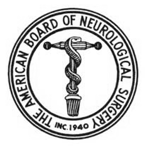American Board of Neurological Surgery

Neurological Surgery
Neurological Surgery constitutes a medical discipline and surgical specialty that provides care for adult and pediatric patients in the treatment of pain or pathological processes that may modify the function or activity of the central nervous system (e.g., brain, hypophysis, and spinal cord), the peripheral nervous system (e.g., cranial, spinal, and peripheral nerves), the autonomic nervous system, the supporting structures of these systems (e.g., meninges, skull & skull base, and vertebral column), and their vascular supply (e.g., intracranial, extracranial, and spinal vasculature).
Treatment encompasses both non-operative management (e.g., prevention, diagnosis—including image interpretation—and treatments such as, but not limited to, neurocritical intensive care and rehabilitation) and operative management with its associated image use and interpretation (e.g., endovascular surgery, functional and restorative surgery, stereotactic radiosurgery, and spinal fusion—including its instrumentation).
Contact the board to learn about specialty and subspecialty certification requirements.
Subspecialty
Neurocritical Care
The medical specialty of Neurocritical Care is devoted to the comprehensive multi-system care of the critically ill patient with neurological diseases and conditions.
